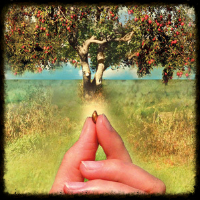 Jesus had effectively communicated the severity of causing offenses. The Pharisees and scribes are historically notorious for such. They refused to submit to the evidence of Jesus as the Christ, and were dedicated to influencing His followers. With high and venerable positions in the Jewish faith they exploited “little ones” and caused them to be led astray. This disgusting action has such an undesirable end that “it would be better for [the offender] if a millstone were hung around his neck, and he were thrown into the sea, than that he should offend one of these little ones” (Luke 17:2). Such warning was handed to “the disciples,” a number which included the chosen apostles (v. 5).
Jesus had effectively communicated the severity of causing offenses. The Pharisees and scribes are historically notorious for such. They refused to submit to the evidence of Jesus as the Christ, and were dedicated to influencing His followers. With high and venerable positions in the Jewish faith they exploited “little ones” and caused them to be led astray. This disgusting action has such an undesirable end that “it would be better for [the offender] if a millstone were hung around his neck, and he were thrown into the sea, than that he should offend one of these little ones” (Luke 17:2). Such warning was handed to “the disciples,” a number which included the chosen apostles (v. 5).
And because such offenses are inevitable (v. 1) Jesus gave additional instruction as to how one should react when shortcomings were personally committed toward another. The sin should not turn us away from a brother. It is an indication of spiritual need. They are in sin. They are lost, and drowning in the sea of iniquity. “Rebuke him; and if he repents, forgive him” (v. 3). One should not sit idly by while his brother is in danger of everlasting destruction. Instead, he should turn him away from that danger. And if that brother repents, “forgive him. And if he sins against you seven times in a day, and seven times in a day returns to you, saying, ‘I repent,’ you shall forgive him” (v. 4).
To rebuke a sinner, and to forgive one who has sinned against you, is a high calling. Such is an act of the divine nature – an expression of agapē. With God it is unlearned. It is an everlasting, thus immutable facet of His nature. This transcendent action is commanded of His followers. Naturally, given the difficulty of such a task, “the apostles said to the Lord, ‘Increase our faith’” (v. 5). They rightly expressed their dependence upon their Lord for the strength to do that which He commands, and His response is eye opening.
“So the Lord said, ‘If you have faith as a mustard seed, you can say to this mulberry tree, “Be pulled up by the roots and be planted in the sea,” and it would obey you’” (v. 6). Personal effort to increase faith is a necessary part of the life of a Christian. We are called to daily growth. Yet, the nature of said faith must be understood. Jesus spoke as if the quantity of faith did not possess the power necessary to perform great tasks. For the mustard seed is of the smallest seeds, and a measure of faith equal to it is sufficient to accomplish a seemingly impossible task. Contrariwise, the object of faith is the source of power – “So then faith comes by hearing, and hearing by the word of God” (Romans 10:17). If God gives us information, information which demands action, such action is able to be performed. He would not require of us something which He failed to make possible. Jesus spoke metaphorically concerning the mulberry tree just as He spoke metaphorically concerning the mountain (cf. Matthew 17:20; 21:21; Mark 11:23). Anything God commands of us we can do. If moving mountains were part of His will, upon faith produced by the command we would be able to move mountains. But that is not the kingdom of God – “For the kingdom of God is…righteousness and peace and joy in the Holy Spirit” (Romans 14:17). Those who suggest that God desires their physical success, and it can be attained if they just have faith, sorely miss the point.
God is not concerned with our physical goals – “For what profit is it to a man if he gains the whole world, and loses his own soul?” (Matthew 16:26). He desires our very souls. He has provided salvation for His creation, and it is attainable only through Him (cf. John 14:6). “The eunuch said, ‘See, here is water. What hinders me from being baptized?’ Then Philip said, ‘If you believe with all your heart, you may’” (Acts 8:36-37). And if YOU believe, you may as well. And you can continue to do that which God expects you to do.
